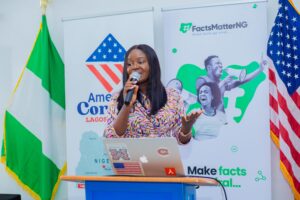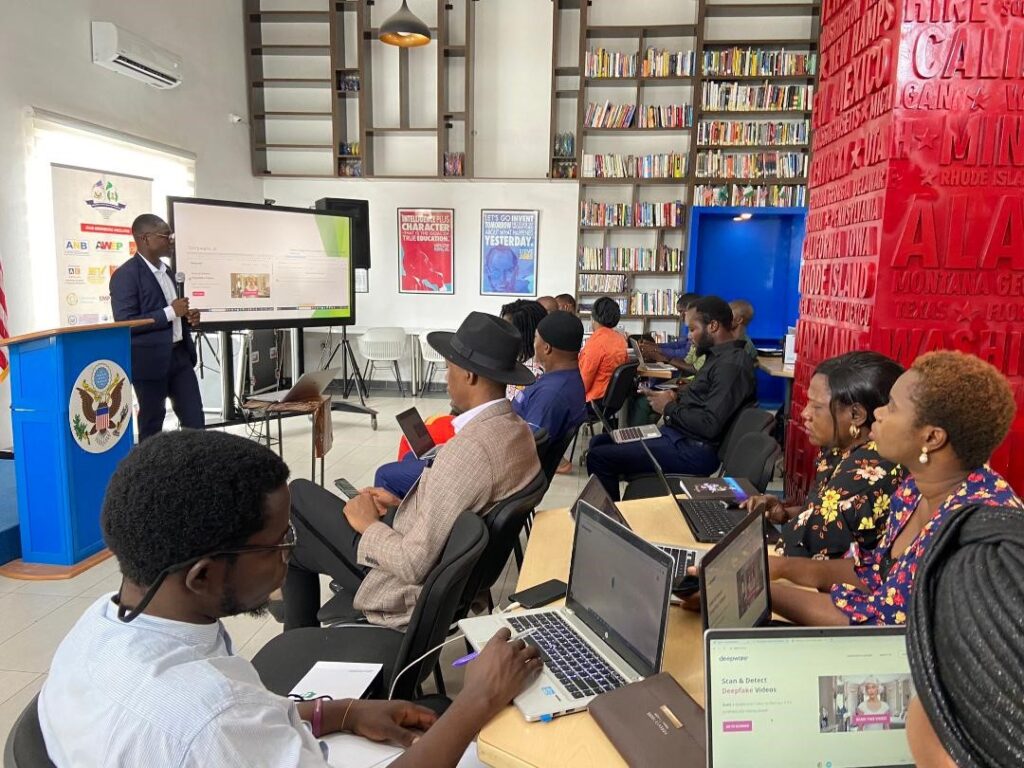Journalists, digital creators and everyone involved in disseminating information have been urged to ensure the veracity of their messages.
They were advised on strategies to adopt at a one-day workshop organised by FactsMatterNG, a fact-check-based organisation supported by the United States Consulate General, Lagos.
According to Hannah Ajakaiye, Team lead, FactsMatterNG and ICFJKnight fellow, “sanitising information is vital for democratic participation so that people are better informed and can make the right decision and empowered to make the government accountable”.
She expressed concern over how social media and close messaging apps like WhatsApp amplify the spread of fake news, as well as government agents investing in funding disinformation initiatives.

Citing a quote by Nobel Laureate Maria Ressa, Ajakaiye noted, “Without facts, you can’t have truth. Without truth, you can’t have trust. Without trust, we have no shared reality, and no democracy”.
One of the facilitators, David Ajikobi, Nigeria Editor at Africa Check, said fact-checking is necessary because disinformation has real-life consequences.
“He said, she said” reporting can be life-threatening. People need access to accurate information to make well-informed decisions. Opinions and claims about the future are not fact-checkable” he stated.
Ajikobi stressed the need for people to have access to accurate information to make well-informed decisions and urged individuals to push beyond their own biases when evaluating information.
He said people should ask themselves if they are objective, presenting all sides of the story, and checking all the facts, regardless of personal agreement.
“Everyone who creates and shares information has an agenda. To address your own biases, therefore, ask yourself, am I objective, am I giving all sides of the story, have I checked all the facts – whether I personally agree with them or not,” he said adding that, “when there is a gap in information, it leads to misinformation and disinformation”.
Another Facilitator, Silas Jonathan, Researcher and OSINT Expert at Dubawa, conducted a hands-on session discussing practical steps and tools to navigate the information ecosystem and guard against disinformation.
He explained the concept of synthetic media, which includes manipulated, artificially generated, or altered content.
According to him, “Synthetic media is all about manipulated, artificially generated or altered content. It capitalises on your mind, it’s about how you perceive life and what you see life to be”.
He, however, explained the types of synthetic media: the audio manipulated, text generated and machine learning algorithms, adding that AI is still learning and can never understand like humans.
While encouraging everyone to consider the context in which messages are given and how it is delivered, Jonathan stressed the need for journalists to take their time in gathering facts and verifying their sources before sharing information.
He advised trusting the process and not rushing it, as truth doesn’t go stale. “You don’t rush the process, you trust the process, for those that want to drop the news hot, take time to fact check because truth doesn’t go stale”.
Dr. Chioma Nwakanma Akanno, A Medical Doctor and Digital Content Creator, known as Dr. Zobo, emphasised the importance for journalists to allocate an extra five minutes to verify sources before sharing information.
Kunle Idowu, an Actor, Digital Content Creator popularly known as Frank Donga, shared his experience, and how his message was taken out of context.
He explained how different individual motives and agenda can facilitate the spread of fake news all around.
“My concern is not much on the lies and misinformation but how half or incomplete truth is shared and taken out of context.”
He, therefore, advised journalists to report balanced stories, treating all sides of the matter.
In his keynote address, United State Consulate Public Affairs Officer, Joe Kruzich, lauded the campaign initiative to combat disinformation and misinformation noting that misinformation is a global phenomenon that was also rife during elections in the United States.
He noted that journalists are critical in the development of any nation as they can hold policy and decision-makers to account and their activities must be devoid of bias and false information that can pose a threat to social stability.
He charged journalists not to mistake differences in views as disinformation and misinformation.
“Misinformation is a deliberate attempt. We are not trying to create a one-perspective society where everyone has the same idea and takes on the same matter, rather an honest society where there are debates and varying opinions, but within an honest space.”
He stated that truth matters greatly and that democracy can only survive on truth, adding that “A lie can travel halfway around the world while the truth is still putting on its shoes.”
READ ALSO: 10 more media organisations selected for Innovation Program


